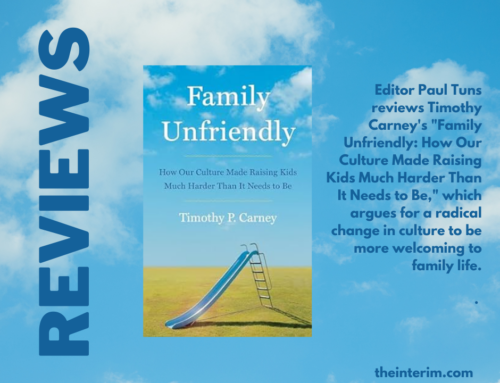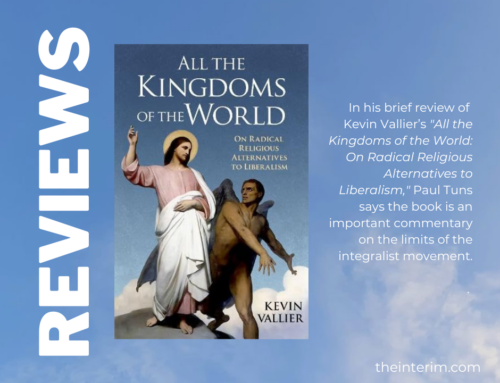From the editor’s desk:
I have noted before that the greatest influence on my thought and writing is George F. Will, but he has not the only writers to guide my political thinking and career choice. Two others were the historian Paul Johnson and journalist Patrick J. Buchanan. In January, we lost Johnson who died at the age of 94 and Buchanan, who retired his pen (or, I guess, keyboard) at the age of 84. It is worth noting that they were born exactly ten years apart, sharing Nov. 2 as their birthday.
Johnson was a journalist who started out on the Left, editing the British New Statesman magazine before becoming the original neoconservative, moving rightward after experiencing the excess enthusiasms of British Labour and Liberal politics in the late 1960s. He would become a columnist for the right-leaning Spectator magazine and Daily Mail newspaper, and befriend Margaret Thatcher. But it was as a popular historian that he made his mark. Two books are often cited as influential, and they both certainly influenced me: Intellectuals: From Marx and Tolstoy to Sartre and Chomsky (1983) and Modern Times: A History of the Modern World from the 1920s to the 1980s (1988).
Intellectuals skewers some of the most respected minds of the last few centuries, noting their personal foibles and laying blame for their ideas (at least in part) to their moral failings as human beings. Johnson takes ideas seriously, viewing them as the primary driver of human history and he is not above laying blame for the consequences of those idea on favoured intellectuals. He criticizes the British writer Cyril Connolly, about whom it may be said, “laid the egg of permissiveness in rather the same way that Erasmus laid the egg of the Reformation” thereby leading to “changes affecting almost every aspect of social, cultural and sexual life.”
Modern World begins with the sentence: “The modern world began on 29 May 1919 when photographs of a solar eclipse … confirmed the truth of a new theory of the universe.” The theory was Einstein’s special theory of relativity and it shattered the dominant paradigm of Newton’s physics. Johnson would later make the connection between the disruption of mankind’s understanding of the absolutes of time and space to the “perhaps inevitable” relativism that infected moral thinking, while noting that relativity and relativism are not the same thing.
Johnson wrote large, magnificent histories of the United States, England, Ireland, Christianity, the Jews, art, and early 19th century, before retiring to writing shorter biographies (Socrates, George Washington, Napoleon), among others). His Art: A New History – Johnson was an accomplished watercolourist himself and would gift his paintings to visitors – puts forward several unorthodox critiques, lambasting the overrated Picasso and putting on a pedestal Grant Wood’s “American Gothic.” About those large books – several check in at over 1000 pages – Norman Podhoretz said he understood how one could write such books but how could he possibly research everything he wrote about. Johnson’s technique, which challenged the patience of his long-suffering wife, was to make notes on index cards and spread them all over the dining room – the table, the floor, wherever there was room.
Johnson, a cradle Catholic who attended daily Mass, was a critic of modernism’s worst excesses. I had the pleasure of hearing him at a Donner Foundation-sponsored event in Toronto in the 1990s and he said as an aside, much to the chagrin of most of the audience, “there will never be peace in our world until women are no longer allowed to kill their babies in the womb.”
I watched Patrick J. Buchanan, a former official in the Nixon and Reagan White Houses, as the host of CNN’s Crossfire and Capital Gang shows in the late ‘80s and early ‘90s, and guest of The McLaughlin Group (Buchanan brought John McLaughlin, a former Jesuit priest, to work in the Nixon White House.) Buchanan was feisty and he combined a deep knowledge of events and issues with a rhetorically flair that few of his guests or intellectual sparring partners could match.
Buchanan was also a cradle Catholic, but unlike Johnson, grew up on the right (the Buchanan family admired (from afar) the regime of Francisco Franco). He got his start writing for the St. Louis Globe-Democrats and quickly became its editorial writer. He briefly stepped away from his journalism career for stints in two Republican administrations and again in 1992 to challenge President George H.W. Bush for the Republican nomination. During his televised convention speech that August, he rallied the base for what is simply know as “The Culture War Speech.”
In that speech, Buchanan spoke of the need for Republicans and Professional Conservatives to speak for and to “conservatives of the heart,” those who “do not read Edmund Burke or Adam Smith,” but who are every bit of the conservative movement as the brainy nerds at think tanks and the ivory tower. In many ways, he foreshadowed the rise of Donald Trump.
In that same speech, Buchanan said there is “a religious war going on in our country for the soul of America.” He would write about it often in his syndicated columns, highlighting attacks on the family, churches, schools, and nation, and defending the historic and traditional cultural mores and moral norms.
But Buchanan knew that America was not only being led astray by a secular, liberal elite. Americans had allowed themselves to be corrupted. In his autobiography, Right from the Beginning (1988), he noted that 18 million unborn babies were killed in the 15 years after Roe v. Wade: “the equivalent of the population of Australia has been sliced up in the womb and sucked out, in a country that endlessly lectures the world on human rights.” He said that the Supreme Court allowed abortion but the government did not “mandate those 18 million deaths. We, the people, did.” He said the “abortuaries of the West are the Free World terminals for the trains that left earlier this century for destinations like Vorkuta and Kolyma, Treblinka and Auschwitz, killing fields founded on the Orwellian principle that while all human beings are equal, some are more equal than others.”
Buchanan said that compassion for the victims of modern excesses — the satisfaction of the stomach over the mind — does not preclude us from “the obligation to speak the truth.” I disagreed with Buchanan on his “America First” foreign and trade policies, but no one could doubt his sincerity in promoting his vision of how America should be run in his columns, books, and television appearances.
He was a fierce critic of those on the Right that surrendered – and worse, those who preached surrender – on cultural issues, whether because they had changed their minds, thought issues such as schools curricula, abortion and same-sex “marriage” were election losers, or merely considered those topics distractions from the “important” issues such as fiscal and foreign policy. What are conservatives conserving if not our cultural patrimony? Buchanan wrote in his autobiography: “If the faith that gave birth to the culture and civilization is pulled up by its root and dies, as Christianity is dying in Europe and post-modern America, the culture and civilization born of that faith will die.” Buchanan asks, “What then, will keep us together,” noting that “democracy is not enough.”
Buchanan was a critic of the liberal mania for democracy, preferring that the U.S. return to its constitutional roots of ending the direct election of senators (just as voters choose electors to vote for president and not directly for the presidential candidate). He once called democracy “a false god.” Certainly this point of view was influenced by not only his respect for the historic roots of the U.S. political system and the wisdom of its founders, but his acknowledgement of the fallen nature of mankind, the moral corruption that leads roughly a million American women to kill their preborn children each and every year, and millions more to sit on their hands while this slaughter occurs.
The world has lost two voices that have reminded readers of the necessity of grounding ourselves in something larger than the self, whether it is the wisdom of custom and tradition or the eternal guidance of Christianity. Fortunately, they both have a large body of work that remains relevant for anyone looking for conservative wisdom.




